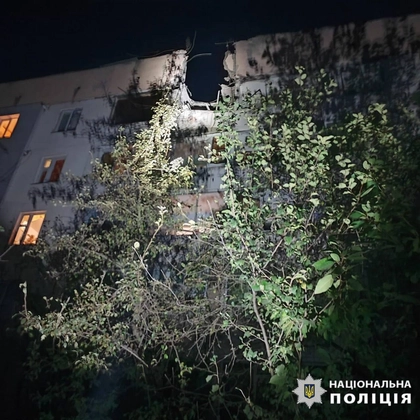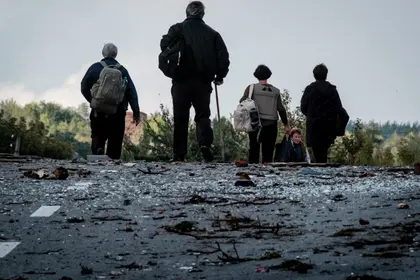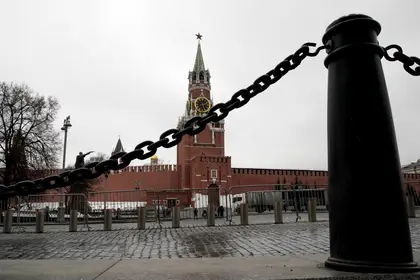People walk out of their homes tentatively. A crowd begins to gather around the two vans and one SUV that have parked in front of the police station down the street from the stadium overlooking the river. Mostly elderly, they line up in an orderly manner to receive humanitarian aid: bags full of rice, wheat, canned goods, oil. There’s the loud sound of shelling from beyond the buildings, but by now the locals understand it’s outgoing, for the most part.
The Russian soldiers who had been in Kupiansk since Feb. 27 are now gone. On Sept. 10, as part of their lightning counteroffensive in the Kharkiv Oblast, Ukrainian forces liberated the city.
JOIN US ON TELEGRAM
Follow our coverage of the war on the @Kyivpost_official.
Nevertheless, some of the Russian forces are still posing resistance about five kilometers away across the Oskil River. Continual explosions can be heard from various points all around the city.
Liudmyla – most residents are still wary of giving their last names, or even their patronymics – barely flinches. But she admits being scared. “It’s terrifying. Rockets flying over our heads for days, from both directions,” she says. “I have a daughter and son-in-law in Kharkiv, but I don’t want to be evacuated. I want to stay here.”
Others come to organize the evacuation of relatives who have trouble walking. The volunteers from this organization come every other day, and various groups take turns to make sure someone from the outside comes in every day.

Kyiv Hit by Massive Drone Attack as Russian Strikes Target Multiple Ukrainian Cities
Nadia, 69, has brought all her transportable possessions to the curb in a small duffle bag and two large plastic shopping bags. She’s tiny: Her gaunt face with bright blue eyes and no teeth is crowned by a hot pink baseball cap. Nadia refuses help to carry her bags, insisting she’s strong enough to do it herself.
“I have no one here anymore,” she says. “My nephew left. I don’t know where he went. Where will they be taking me?”
The volunteer explains that all the evacuees who don’t have a place to stay will be going to a shelter in Kharkiv, Ukraine’s second biggest city, about 115 kilometers away.
Nadia seems resigned to her fate. She has all her documents on her, but suddenly remembers she left the deed to her apartment in a hiding place back home. “Oh well, I think it will still be here,” she says as if trying to convince herself.
As the residents get more comfortable with the volunteers, they begin to ask for news. There has been no phone connection for nearly two weeks and, before that, the Russians blocked all news or information: From the beginning of the invasion, Kupiansk became the de facto seat of the Russian-installed military-civilian administration in the Kharkiv Oblast.
The residents ask about towns to the east, across the river – Svatove, Pishchane, Petropavlivka. The volunteers give as much detailed information about the progress of the offensive as they have. People are optimistic. More and more villages are coming under Ukrainian control, more and more relatives and friends freed from the occupiers.
The volunteer finishes his news update and gathers a few women to shoot a quick promotional video for the charitable organization funding this humanitarian convoy.
Switching from Russian (most conversations in this part of Ukraine are in Russian) to an impeccable Ukrainian, the volunteer explains where they are and introduces the recipients of the aid. The three women being filmed also switch into Ukrainian and thank the donors for their generosity. “All will be Ukraine,” they conclude – a phrase that has become a motto of hope since the beginning of the war.
The conversations resume in Russian as soon as the phone stops filming.
There’s another salvo of artillery – probably Grads, a terrifying multiple launch rocket system that can rain explosives on an area the size of scores of football fields. About a minute later, a rumble is followed by explosions.
“Aviation,” the volunteer says, then pivots seamlessly from encouraging scared residents, to shooting another video. “Listen. This is what these people have to contend with every day.”
Some children show up, as well as a few older men who seem accustomed to the conditions already.
Borys Hryhorovych, 72, has enough stocks of food at home. He’s looking for candles and matches. Everyone is asking for candles, lighters and matches. People are forced to cook outside. The gas and light have been out for weeks, in some places for months.
Borys also wants to know what’s happening with the military on the other side of the river. “My grandson is fighting there with the UAF (Ukrainian Armed Forces). ‘Medved’ (Bear) is his call sign.”
He says that things were relatively quiet while the Russians were there. “They left us alone, except for the ones they suspected of having military experience. Those they took away.”
At one point the Russians began offering citizenship and Russian passports to residents. “Unbelievable. There were young kids, boys 17 years old or so, lining up to get their passports, all happy. Then they found out they might get drafted with the LNR (Luhansk People’s Republic) guys and they changed their tune.”
Another elderly man, Ivan Vasylovych, approaches a volunteer with a piece of paper. “If you’re going back across the line to where there’s a phone signal, please call my daughter in Kharkiv and tell her I’m fine, healthy, and all is good.”
Natalia tells one of the volunteers that she needs money and none of the ATM machines or banks here have access to her account, where her monthly pension gets deposited. She can’t leave because her father needs to be cared for. The volunteer offers to pick up the money from Natasha’s sister in Kharkiv, then bring it up in two days when he returns to Kupiansk. He shoots a video of her giving her sister instructions on how to hand off the money to the volunteer.
At one point, an incoming shell lands a few hundred meters away. The residents calmly disperse, but no one panics – as if it’s all become routine. The volunteers distribute the various evacuees into the vehicles which try to get back on the road so they can reach Kharkiv before nightfall.
Farther south about 70 kilometers, the Ukrainians have already liberated Izyum to the point where the only audible explosions are coming from dozens of kilometers to the east, most likely from areas where the UAF is fighting to encircle Russian troops in the town of Lyman.
On Izyum’s deserted main street, Olga, 62, gets a lift from volunteers to bring a heavy box of canned goods from about a kilometer away to her fifth-floor walk-up. She lives alone. Her son died in Sloviansk in 2015. Her daughter left for western Ukraine. “Look, they bombed out the windows when they hit that school there,” she says, pointing at a wall, behind which a damaged building sits with a hole in its roof. “It’s been like that since March.”
The streets are bathed by a steady drizzle and the gray sky shrouds one destroyed building after the other. The part of the town by the river and bridges is practically in ruins. Another school is gutted: charred desks, chairs, even report cards strewn all over; and the church next door has a hole through its golden dome. “Planes came in March and blew up everything,” says Inna, who spends the afternoon in the middle of the pedestrian bridge, in the rain, offering passersby free coffee from a thermos.
Otherwise, almost none of the stores in Izyum are open. What didn’t get bombed when the Russians first attacked on March 3 was hit as the Ukrainians pushed the Russians out in the second week of September.
Even one of the ninth-century Polovtsian statues on the ancient burial mound looming over Izyum – one of the city’s archeological treasures – was destroyed.
Just outside of town, where the Russians had been based, there is a dense presence of Ukrainian troops. The three stores selling produce and meat are busy, not only with the military, but also crews of journalists coming to report on the nearby mass grave found next to a cemetery.
Kostya, 60, sits in front of one of the shops, smoking a cigarette, watching all the soldiers and other new arrivals. Asked how it was during the occupation, all he says is: “There’s no way you can imagine what it was like.” Then he responds with a question: “Tell me, is war good or bad?” He takes a deep drag from his cigarette and adds, “I don’t think there are any good or evil nations. Only evil people.”
One woman, Olga, complains that the bread factory is still not working, neither is the mushroom factory, nor the brewery. “We need to work. Is this the way they want to unite Ukraine? Pardon me, but is this better than when we all had work?”
She continues within earshot of soldiers, who ignore her. A couple of women selling homemade snacks dismiss her curtly.
Up the hill, toward the pine forest, is the cemetery. Dozens of men in hazmat suits are hauling off the last of the bodies exhumed from the mass graves, which the Russians dug to bury Ukrainians mostly shot in the head or bludgeoned, many still with their hands tied.
Ruslan, call sign Lev, is a soldier patrolling the area around the cemetery. He’s 50, with a graying beard. He comes from Sambir in western Ukraine. He tried to come out to fight for his country several times since the first invasion in 2014, but something always came up. “One time my wife was about to have a child. Another time she was sick with cancer. But this time nothing was going to stop me,” he says, walking alongside the now empty graves.
“Just the other day they found a buried couple with their rib cages open and shattered. The man had his genitals cut off. This is what we’re up against,” he says, as the stench of dead bodies wafts across the edge of the damp pine forest.
You can also highlight the text and press Ctrl + Enter






